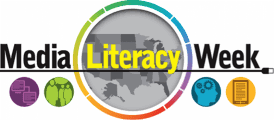Resources for Media Literacy
by Mary Ellen Daneels, Civics Instructional Specialist
October 21-25th marks the 5th Annual U.S. Media Literacy Week. The mission of Media Literacy Week is to raise awareness about the need for media literacy education and its essential role in education today. Organizations, schools, and educators from all over the country will be sharing resources via #MediaLitWk. In the 2017 report, “The Republic is (Still) at Risk—and Civics is Part of the Solution”, cites media literacy as a complementary stream of civic education. The report explains:
...young people are increasingly empowered to influence the topics and stories that are widely shared. At the same time, they are deluged with unreliable information and actual propaganda, and research shows that most young people perform poorly at distinguishing fake news from reliable news. This skill can be taught effectively in schools, and students can learn to be effective producers of news. Given these recent developments, the need for news media literacy education is acute.
Media literacy is central to #CivicsInTheMiddle work. Students must learn how to be wise consumers of information; as well as practice how to engage with and produce information. Here are some resources to support #MedLitWk and media literacy throughout the year.
- National Association for Media Literacy Education (NAMLE), organizes #MediaLitWk and supports information literacy year-round.
- The News Literacy Project has lesson plans, archived webinars and a digital platform called Checkology that can be used in one-to-many or one-to-one. classrooms. Don’t forget to subscribe to their weekly newsletter called The Sift for weekly updates on “teachable moments” related to news literacy.
- iCivics has curriculum units for middle and high school classrooms on news literacy, as well as media and influence. The NewsFeed Defenders game engages students to learn how to spot a variety of methods behind the viral deception we all face today.
- The Stanford History Education Group has created assessments of civic online reasoning—the ability to judge the credibility of digital information about social and political issues.
- Crash Course has a 12-part video series on Media Literacy.
- Newseum ED has wonderful infographics for classroom use as well as lesson plans.
- Facing History and Ourselves partnered with the News Literacy Project to create a timely unit on media literacy called “Facing Ferguson” that is appropriate for high school students.
- The American Press Institute has activities and lesson plans for all ages.
- This link from Edutopia has vetted a 5-minute film festival with nine videos on news literacy.
- LAMP, or Learning about Multimedia Project, has materials that shine a light to “challenge stereotypes, fake news and more.”
- The Center for News Literacy at Stony Brook University has a Digital Resource Center that teachers can sign up for to curate resources for classroom use.





Comments
Post a Comment